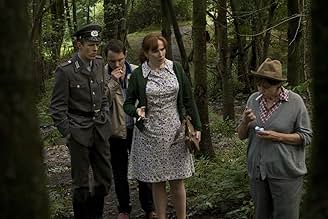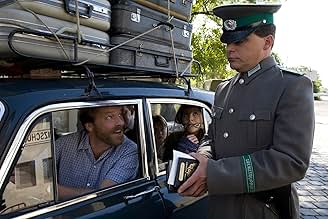En 1968, una familia británica disfuncional emprende un viaje caótico de West Yorkshire a Alemania Oriental y de vuelta, revelando sus relaciones fracturadas.En 1968, una familia británica disfuncional emprende un viaje caótico de West Yorkshire a Alemania Oriental y de vuelta, revelando sus relaciones fracturadas.En 1968, una familia británica disfuncional emprende un viaje caótico de West Yorkshire a Alemania Oriental y de vuelta, revelando sus relaciones fracturadas.
- Premios
- 1 premio ganado en total
Ottilia Borbáth
- Frau Glock
- (as Ottília Borbáth)
- Dirección
- Guionistas
- Todo el elenco y el equipo
- Producción, taquilla y más en IMDbPro
Argumento
¿Sabías que…?
- TriviaJessica Barden's debut.
- ErroresIn the scene where Mrs. Ratcliffe drives the Wartburg through the border fence, you can see in the background a black, red and yellow striped border post. In the film the post is on the East side but in reality these posts were only on the West side, facing West (they had a metal DDR plaque attached) indicating to anyone approaching the East that 'this is where the DDR Republic starts'.
- Bandas sonorasAll My Tomorrows
Music by Jimmy Van Heusen
Lyrics by Sammy Cahn
Performed by Gary Williams / The John Wilson Orchestra
Opinión destacada
Der Spiegel (Spiegel-Online)July 03, 2009 Majority of Eastern Germans Feel Life Better under Communism By Julia Bonstein
Glorification of the German Democratic Republic is on the rise two decades after the Berlin Wall fell. Young people and the better off are among those rebuffing criticism of East Germany as an "illegitimate state." In a new poll, more than half of former eastern Germans defend the GDR.
The life of Birger, a native of the state of Mecklenburg-West Pomerania in northeastern Germany, could read as an all-German success story. The Berlin Wall came down when he was 10. After graduating from high school, he studied economics and business administration in Hamburg, lived in India and South Africa, and eventually got a job with a company in the western German city of Duisburg. Today Birger, 30, is planning a sailing trip in the Mediterranean. He isn't using his real name for this story, because he doesn't want it to be associated with the former East Germany, which he sees as "a label with negative connotations."
And yet Birger is sitting in a Hamburg cafe, defending the former communist country. "Most East German citizens had a nice life," he says. "I certainly don't think that it's better here." By "here," he means reunified Germany, which he subjects to questionable comparisons. "In the past there was the Stasi, and today (German Interior Minister Wolfgang) Schäuble -- or the GEZ (the fee collection center of Germany's public broadcasting institutions) -- are collecting information about us." In Birger's opinion, there is no fundamental difference between dictatorship and freedom. "The people who live on the poverty line today also lack the freedom to travel."
Birger is by no means an uneducated young man. He is aware of the spying and repression that went on in the former East Germany, and, as he says, it was "not a good thing that people couldn't leave the country and many were oppressed." He is no fan of what he characterizes as contemptible nostalgia for the former East Germany. "I haven't erected a shrine to Spreewald pickles in my house," he says, referring to a snack that was part of a the East German identity. Nevertheless, he is quick to argue with those who would criticize the place his parents called home: "You can't say that the GDR was an illegitimate state, and that everything is fine today."
Glorification of the German Democratic Republic is on the rise two decades after the Berlin Wall fell. Young people and the better off are among those rebuffing criticism of East Germany as an "illegitimate state." In a new poll, more than half of former eastern Germans defend the GDR.
The life of Birger, a native of the state of Mecklenburg-West Pomerania in northeastern Germany, could read as an all-German success story. The Berlin Wall came down when he was 10. After graduating from high school, he studied economics and business administration in Hamburg, lived in India and South Africa, and eventually got a job with a company in the western German city of Duisburg. Today Birger, 30, is planning a sailing trip in the Mediterranean. He isn't using his real name for this story, because he doesn't want it to be associated with the former East Germany, which he sees as "a label with negative connotations."
And yet Birger is sitting in a Hamburg cafe, defending the former communist country. "Most East German citizens had a nice life," he says. "I certainly don't think that it's better here." By "here," he means reunified Germany, which he subjects to questionable comparisons. "In the past there was the Stasi, and today (German Interior Minister Wolfgang) Schäuble -- or the GEZ (the fee collection center of Germany's public broadcasting institutions) -- are collecting information about us." In Birger's opinion, there is no fundamental difference between dictatorship and freedom. "The people who live on the poverty line today also lack the freedom to travel."
Birger is by no means an uneducated young man. He is aware of the spying and repression that went on in the former East Germany, and, as he says, it was "not a good thing that people couldn't leave the country and many were oppressed." He is no fan of what he characterizes as contemptible nostalgia for the former East Germany. "I haven't erected a shrine to Spreewald pickles in my house," he says, referring to a snack that was part of a the East German identity. Nevertheless, he is quick to argue with those who would criticize the place his parents called home: "You can't say that the GDR was an illegitimate state, and that everything is fine today."
- redbabbs
- 27 jun 2015
- Enlace permanente
Selecciones populares
Inicia sesión para calificar y agrega a la lista de videos para obtener recomendaciones personalizadas
Detalles
- Fecha de lanzamiento
- Países de origen
- Sitio oficial
- Idioma
- También se conoce como
- La revolución de la Sra. Ratcliffe
- Locaciones de filmación
- Productoras
- Ver más créditos de la compañía en IMDbPro
Taquilla
- Total a nivel mundial
- USD 177,712
- Tiempo de ejecución1 hora 42 minutos
- Color
- Relación de aspecto
- 1.85 : 1
Contribuir a esta página
Sugiere una edición o agrega el contenido que falta

Principales brechas de datos
What is the English language plot outline for Mrs. Ratcliffe's Revolution (2007)?
Responda























